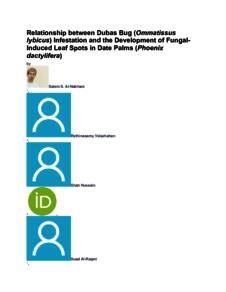وثيقة
Relationship between Dubas Bug (Ommatissus lybicus) infestation and the development of fungal-induced leaf spots in date palms (Phoenix dactylifera).
المساهمون
Velazhahan, Rethinasamy., مؤلف
Hussain, Shah., مؤلف
Al-Raqmiyah, Suad., مؤلف
Al-Hashamiyah, Maryam., مؤلف
Al-Sadi, Abdullah M., مؤلف
الناشر
Insects.
ميلادي
2023-03
اللغة
الأنجليزية
الملخص الإنجليزي
The dubas bug (Ommatissus lybicus) (Hemiptera: Tropiduchidae) is a serious pest in date palms in several
date-producing countries, including Oman. Infestation results in a severe reduction in yield and a weakening
of date palm growth. In addition, egg laying, which causes injuries to date palm leaves, results in the
development of necrotic lesions on the leaves. This study aimed at investigating the role of fungi in the
development of necrotic leaf spots following dubas bug infestation. Leaf samples developing leaf spot
symptoms were collected from dubas-bug-infested leaves, as the leaf spot symptoms were not observed
on the non-infested leaves. Isolation from date palm leaves collected from 52 different farms yielded 74
fungal isolates. Molecular identification of the isolates revealed that they belonged to 31 fungal species, 16
genera, and 10 families. Among the isolated fungi, there were five Alternaria species, four species each
of Penicillium and Fusarium, three species each of Cladosporium and Phaeoacremonium, and two species
each of Quambalaria and Trichoderma. Out of the thirty-one fungal species, nine were pathogenic on date
palm leaves and induced varying levels of leaf spot symptoms. The pathogenic species were Alternaria
destruens, Fusarium fujikuroi species complex, F. humuli, F. microconidium, Cladosporium
pseudochalastosporoides, C. endophyticum, Quambalaria cyanescens, Phaeoacremonium krajdenii,
and P. venezuelense, which were reported for the first time as leaf spot causal agents in date palms. The
study provided novel information on the effect of dubas bug infestation in date palms on the development
of fungal infection and associated leaf spot symptoms
المجموعة
قالب العنصر
مقالات الدوريات

